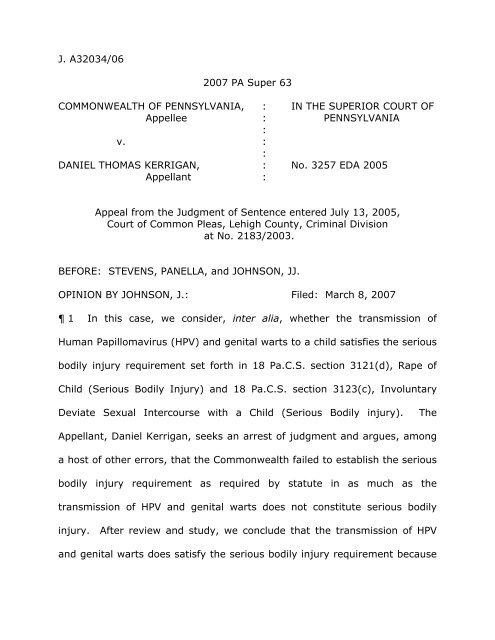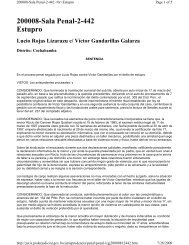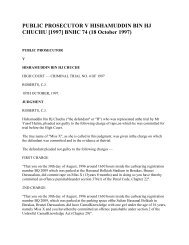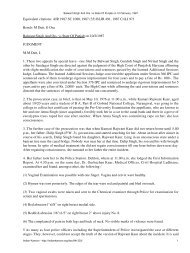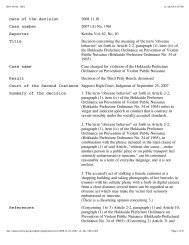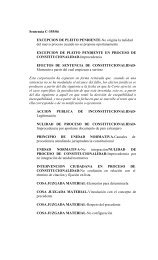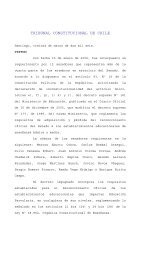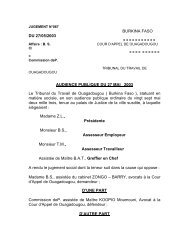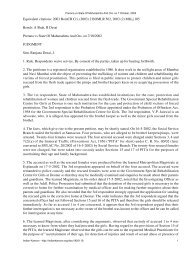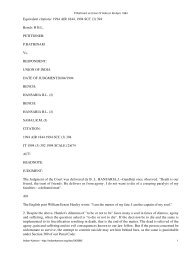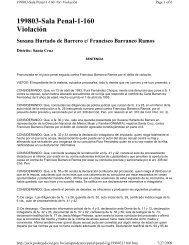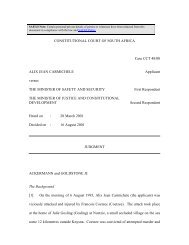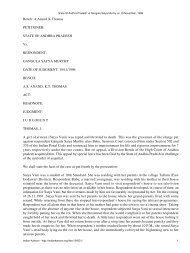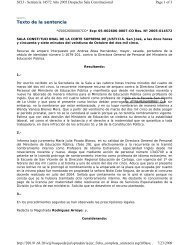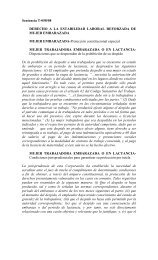Commonwealth v. Kerrigan
Commonwealth v. Kerrigan
Commonwealth v. Kerrigan
- No tags were found...
Create successful ePaper yourself
Turn your PDF publications into a flip-book with our unique Google optimized e-Paper software.
J. A32034/062007 PA Super 63COMMONWEALTH OF PENNSYLVANIA, : IN THE SUPERIOR COURT OFAppellee : PENNSYLVANIA:v. ::DANIEL THOMAS KERRIGAN, : No. 3257 EDA 2005Appellant :Appeal from the Judgment of Sentence entered July 13, 2005,Court of Common Pleas, Lehigh County, Criminal Divisionat No. 2183/2003.BEFORE: STEVENS, PANELLA, and JOHNSON, JJ.OPINION BY JOHNSON, J.: Filed: March 8, 2007 1 In this case, we consider, inter alia, whether the transmission ofHuman Papillomavirus (HPV) and genital warts to a child satisfies the seriousbodily injury requirement set forth in 18 Pa.C.S. section 3121(d), Rape ofChild (Serious Bodily Injury) and 18 Pa.C.S. section 3123(c), InvoluntaryDeviate Sexual Intercourse with a Child (Serious Bodily injury).TheAppellant, Daniel <strong>Kerrigan</strong>, seeks an arrest of judgment and argues, amonga host of other errors, that the <strong>Commonwealth</strong> failed to establish the seriousbodily injury requirement as required by statute in as much as thetransmission of HPV and genital warts does not constitute serious bodilyinjury. After review and study, we conclude that the transmission of HPVand genital warts does satisfy the serious bodily injury requirement because
J. A32034/06of the permanent nature of the disease, the fact that the victim risks passingthe virus to any future sexual partners or children she may choose to havethrough the birth canal, and because there is a strong link between HPV andcervical and other genital cancers. Consequently, we hold that <strong>Kerrigan</strong>’sargument on that issue does not require reversal of the trial court’sJudgment of Sentence. 2 In addition to appealing the conviction Rape of a Child (Serious BodilyInjury) and Involuntary Deviate Sexual Intercourse with a Child (SeriousBodily injury), <strong>Kerrigan</strong> also appeals his convictions for Rape of a Child,Involuntary Deviate Sexual Intercourse, two counts of Aggravated IndecentAssault, Indecent Assault, and Corruption of Minors.See 18 Pa.C.S.§§ 3121(c), 3123(b), 3125(a)(1)(b), 3126(a)(7), 6301(a)(1). In support ofhis appeal, <strong>Kerrigan</strong> sets forth a number of arguments, including, inter alia,that the evidence was insufficient to support certain convictions, that thetrial court lacked jurisdiction, that the trial court erred in unconstitutionallyshifting the burden of “being believed” onto <strong>Kerrigan</strong>, that the trial courterred in failing to grant a mistrial after a witness revealed <strong>Kerrigan</strong> hadpreviously been incarcerated and that his trial counsel was ineffective. Afterreview and study, we find that none of <strong>Kerrigan</strong>’s alleged errors requiresreversal. Consequently, we affirm the trial court’s judgment of sentence.-2-
J. A32034/06 3 This case involves the sexual abuse of a child, A.R., by <strong>Kerrigan</strong>.A.R.’s mother met <strong>Kerrigan</strong> in 1994 and the two began dating in 1996. Theybegan living together in 1999 and A.R. was also a member of the household.<strong>Kerrigan</strong> began sexually abusing A.R., when she was 7 years old and theabuse continued until she was 10 years old, when it was discovered thatA.R. had genital warts. The abuse began while the parties were living inNew Jersey and got worse after the parties moved to Pennsylvania. 4 The trial court set forth the following facts:During their residence at the Whittier Apartments, A.R.made her first accusations of sexual abuse against [<strong>Kerrigan</strong>].Following a discussion between [<strong>Kerrigan</strong>, A.R., and hermother], in which [<strong>Kerrigan</strong>] denied the accusation, [mother]chose not to believe her daughter. A.R. made additionalaccusations of sexual abuse against [<strong>Kerrigan</strong>], and each time[<strong>Kerrigan</strong>] denied it, and no further action was taken. Finally,following a physical inspection of her daughter’s genital area,[mother] made an appointment with a physician, and genitalwarts were discovered.Doctor John Van Brakle, Chairman of Pediatrics at LehighValley Hospital, was qualified as an expert in pediatric medicineand examination and treatment of child sexual assault injuries.Doctor Van Brakle examined A.R. and discovered “a series ofdark lesions, spots, that were in the area around her anus, andthen more anteriorally to the area surrounding her vaginal area.”The genital warts had previously been removed by Dr. JohnScaffidi, whose testimony was presented by stipulation. DoctorScaffidi saw A.R., who was ten (10) at the time, and discoveredthat she had HPV (Human Papillomavirus) “or genital wartsaround her vagina and anus. On that date he used a laser tovaporize all of her external genital warts around her vagina andanus.”-3-
J. A32034/06It was explained by Doctor Van Brakle that genital wartsare transmitted primarily, although not exclusively, by “genitalto genital contact.” HPV is the most common sexuallytransmitted disease amongst adolescents in the United States.This virus is associated with a variety of genital cancers,including cervical cancer. In fact, A.R. is at a higher risk ofdeveloping cervical cancer or cancer of the rectum because sheis HPV positive. “It’s thought that, at least eighty percent . . .perhaps ninety percent of cervical cancer is a result of a previousHPV infection.” Finally, Doctor Van Brakle rendered the opinionthat evidence of sexual abuse was present.A.R. disclosed that [<strong>Kerrigan</strong>] began touching her whenshe lived in New Jersey. Following their arrival at the WhittierApartments, the abuse continued and escalated to vaginal andanal intercourse. The repeated incidents of sexual abuse tookplace in various rooms within the home while her mother waseither not home or sleeping. They also increased as she gotolder with the most frequency at their last residence inCatasauqua [Pennsylvania].Trial Court Opinion (“T.C.O.”), 11/07/05, at 3-4 (footnotes omitted). 5 Following his trial, a jury found <strong>Kerrigan</strong> guilty on all counts and thetrial court sentenced him to twenty-five to fifty years’ imprisonment.<strong>Kerrigan</strong> filed post-sentence motions, which the trial court denied. <strong>Kerrigan</strong>then filed this appeal with our Court, and presents the following list ofquestions for our review:I. Was the evidence insufficient to support the convictionwhich required penile penetration as an element becausethere was insufficient evidence to establish that any crimeinvolving penile penetration as an element thereofoccurred in Pennsylvania?II.Did the court lack subject matter jurisdiction over thecrimes involving penile penetration?-4-
J. A32034/06III.IV.Should this Court find that there was sufficient evidence toconfer jurisdiction on the penile penetration crimes, trialwas counsel [sic] ineffective for failing to request juryinstructions delineating the need to find – beyond areasonable doubt – that such conduct occurred inPennsylvania?Was trial counsel ineffective for failing to raise an objectionto the court’s jury instructions that positioned the case sothat the jury would have to determine who to believe –thereby placing a burden of being believed on thedefendant’s testimony and his defense – and also deprivinghim of reasonable doubts to which he was entitled underthe federal constitution?V. Did the trial court’s general instructions that the defendanthad no burden to prove that he was not guilty and that the<strong>Commonwealth</strong> had the burden of proving each and everyelement of the offense cure or overcome the conflictingand unconstitutional instructions it gave as to the jury’sobligation to determine which conflicting testimony tobelieve?VI.VII.Should the court have granted the defense motion for amistrial when a <strong>Commonwealth</strong> witness revealed that theappellant had been imprisoned in New Jersey?Was trial counsel ineffective for failing to request acautionary instruction as to the alleged prior criminalactivity to which AR testified in New Jersey?VIII. Must an arrest of judgment be granted on Appellant’sconviction for rape of a child with serious bodily injury andinvoluntary deviate sexual intercourse with serious bodilyinjury because serious bodily injury was not proven?Brief for Appellant at 6 (capitalization removed to improve readability). 6 In support of his first question, <strong>Kerrigan</strong> argues that the evidence wasinsufficient to support his convictions “which required penile penetration”-5-
J. A32034/06because the evidence was insufficient to establish that any penetrationoccurred in Pennsylvania. Brief for Appellant at 23. Pursuant to statute,the convictions that require penile penetration are Rape of a Child, Rape of aChild (Serious Bodily Injury), Involuntary Deviate Sexual Intercourse, andInvoluntary Deviate Sexual Intercourse (Serious Bodily Injury). 7 In reviewing a sufficiency claim, we must view all the evidence in thelight most favorable to the <strong>Commonwealth</strong> as the verdict winner todetermine if the fact-finder could have found each element of the crimeproven beyond a reasonable doubt. See <strong>Commonwealth</strong> v. Hughes, 555A.2d 1264, 1267 (Pa. 1989).We may not weigh the evidence, nor“substitute our judgment for that of the fact-finder.” <strong>Commonwealth</strong> v.Zingarelli, 839 A.2d 1064, 1069 (Pa. Super. 2003) (citation omitted).In addition, we note that the facts and circumstances establishedby the <strong>Commonwealth</strong> need not preclude every possibility ofinnocence. Any doubts regarding a defendant's guilt may beresolved by the fact-finder unless the evidence is so weak andinconclusive that as a matter of law no probability of fact may bedrawn from the combined circumstances. The <strong>Commonwealth</strong>may sustain its burden of proving every element of the crimebeyond a reasonable doubt by means of wholly circumstantialevidence. Moreover, in applying the above test, the entire recordmust be evaluated and all evidence actually received must beconsidered. Finally, the trier of fact while passing upon thecredibility of witnesses and the weight of the evidence produced,is free to believe all, part or none of the evidence.<strong>Commonwealth</strong> v. Bullick, 830 A.2d 998, 1000 (Pa. Super. 2003) (citationomitted).-6-
J. A32034/06 8 In support of this question, <strong>Kerrigan</strong> argues that A.R.’s testimony onwhether the abuse occurred in Pennsylvania or New Jersey is contradictoryand that the jury could do more than guess as to whether the abuseoccurred in Pennsylvania. Brief for Appellant at 23.Specifically, he arguesthat initially A.R. denied penile contact in Pennsylvania when she spoke withDetective Rentko, a detective that spoke with her following the allegations ofabuse, but that in a second interview, she stated that <strong>Kerrigan</strong> penetratedher. Brief for Appellant at 25. <strong>Kerrigan</strong> argues that “A.R.’s severelycontradicted hearsay statements” are insufficient evidence that any penilepenetration occurred in Pennsylvania. Brief for Appellant at 25. <strong>Kerrigan</strong>also claims that A.R.’s trial testimony only discussed events which occurredin New Jersey. Brief for Appellant at 25. 9 <strong>Kerrigan</strong> misstates the record and the testimony of Detective Rentko.A.R. testified, on cross-examination, that <strong>Kerrigan</strong> abused her inPennsylvania as well as in New Jersey. During cross-examination, thefollowing exchange took place between A.R. and <strong>Kerrigan</strong>’s counsel:Q: Okay. Where all have you lived that there was some formof abuse?A: Well, we started in New Jersey, and then Pennsylvania. . .****Q: Okay. Did anything take place in Pennsylvania?-7-
J. A32034/06A: Yes, sir.Notes of Testimony (“N.T.”) (Trial), 12/08/04, at 85. Detective Rentkotestified that A.R. told her that the abuse gradually got worse beginningfrom the time she lived in New Jersey and increased when they moved toPennsylvania. N.T. (Trial), 12/08/04, at 264. A.R. also told DetectiveRentko that <strong>Kerrigan</strong> had “put his private inside where she pees and poops.”N.T. (Trial), 12/08/04, at 261. A.R. further told Detective Rentko that<strong>Kerrigan</strong> “mov[ed] up and down” when he was inside of her. N.T. (Trial),12/08/04, at 262. 10 We are unwilling to find that the above testimony and evidence is soweak and inconclusive that as a matter of law the jury was unable to findthat <strong>Kerrigan</strong> penetrated A.R. with his penis in Pennsylvania as prohibited bystatute. Thus, the evidence is sufficient to support <strong>Kerrigan</strong>’s convictions forthe crimes involving penile penetration. 11 In support of his second question, <strong>Kerrigan</strong> argues that the trial courtlacked subject matter jurisdiction because there was insufficient evidence tosupport the commission of the crimes involving penile penetration inPennsylvania. Brief for Appellant at 41. Essentially, <strong>Kerrigan</strong> argues thatbecause the evidence was insufficient to establish that penile penetrationoccurred in Pennsylvania, the trial court lacked subject matter jurisdictionover those crimes. Brief for Appellant at 41.This argument is without-8-
J. A32034/06merit. The court of common pleas has subject matter jurisdiction to hearcases arising out of the Crimes Code. See <strong>Commonwealth</strong> v. Bethea, 828A.2d 1066, 1074 (Pa. 2003) (finding that charges arising out of the CrimesCode are entrusted to the courts of common pleas for proper resolution). Inthis case, we found that sufficient evidence existed for the finding that thecrimes involving penile penetration occurred in Pennsylvania, thus it is clearthat conduct related to the charges occurred in Pennsylvania and jurisdictionis proper there. Consequently, <strong>Kerrigan</strong>’s second question is of no merit. 12 In support of his third question, <strong>Kerrigan</strong> argues that his counsel wasineffective for failing to request a specific instruction that the <strong>Commonwealth</strong>must prove the element of jurisdiction beyond a reasonable doubt. Brief forAppellant at 43.Preliminarily, we note that although pursuant to<strong>Commonwealth</strong> v. Grant, 813 A.2d 726, 737-38 (Pa. 2002), an appellantshould generally wait until collateral review to raise claims of ineffectiveassistance of counsel, this case falls within the exception to that rule.Pursuant to <strong>Commonwealth</strong> v. Bomar, 826 A.2d 831, 853-55 (Pa. 2003),Grant does not apply where the trial court held a hearing and addressed theineffectiveness claim in its Opinion, which occurred in this case. 13 “An ineffective assistance of counsel claim has three elements.”<strong>Commonwealth</strong> v. Battle, 883 A.2d 641, 645 (Pa. Super. 2005).-9-
J. A32034/06Specifically, appellant must show the following: (1) that the[underlying] claim is of arguable merit; (2) that counsel had noreasonable strategic basis for his or her action or inaction;(3) that, but for the errors and omissions of counsel, there is areasonable probability that the outcome of the proceedingswould have been different.Id (citation omitted). 14 Preliminarily, we note that the trial court gave the followinginstructions to the jury:Remember, in this case, as in all cases, one of the veryimportant functions of the jury is to determine the facts. Whatdid actually happen in Catasauqua, Lehigh County,between [A.R.] and Daniel <strong>Kerrigan</strong>, if anything.N.T. (Trial), 12/09/04, at 86 (emphasis added). <strong>Kerrigan</strong> argues that thisinstruction was not adequate and that his counsel was ineffective for failingto request an instruction that the jury must find beyond a reasonable doubtthat the alleged conduct occurred in Pennsylvania. Brief for Appellant at 45-46. The trial court noted that <strong>Kerrigan</strong> conceded that A.R. was sexuallyabused, but that he was not the abuser. T.C.O., 11/17/05, at 6. It furthernoted that <strong>Kerrigan</strong>, “in his own testimony, agreed that A.R. was sexuallyabused but testified that he did not do so. Therefore, jurisdiction would onlyhave been of concern if the defense had made the questionable strategicdecision to allege that the defendant abused A.R. in New Jersey, but notPennsylvania.” Id. Finally, the trial court noted that, “[t]here was no realissue as to jurisdiction until this retrospective analysis attempted to reframe-10-
J. A32034/06the defense.” Id at 7. <strong>Kerrigan</strong>’s trial counsel’s failure to require such aninstruction did not prejudice <strong>Kerrigan</strong>, as he argued that <strong>Kerrigan</strong> did notabuse A.R. in Pennsylvania or New Jersey, and the jury would haveconvicted <strong>Kerrigan</strong> even if the instruction were given. See <strong>Commonwealth</strong>v. Potts, 566 A.2d 287, 295-96 (Pa. Super. 1989). We also note that thereis doubt as to whether an objection as to jurisdiction was of any merit, asrequired by the first prong of the ineffectiveness test because there issufficient evidence to establish that the abuse involving penile penetrationoccurred in Pennsylvania. <strong>Kerrigan</strong>’s third question does not require reversalof his judgment of sentence. 15 In support of his fourth question, <strong>Kerrigan</strong> argues that his trial counselwas ineffective for failing to object to the trial court’s instructions to the jury,claiming that the instructions shifted a burden of proof from the<strong>Commonwealth</strong> to <strong>Kerrigan</strong>. Brief for Appellant at 46. <strong>Kerrigan</strong> argues thatthe trial court’s instructions relating to believability of witnesses placed aburden of being believed on <strong>Kerrigan</strong> and deprived him of his right toreasonable doubt. Brief for Appellant at 46. As discussed above, in order tosucceed on a claim for ineffective assistance of counsel, the appellant mustprove: the merits of the underlying claim, that counsel had no strategicreason for taking the actions he took, and that but for the errors of counsel,the outcome of the trial would have been different. See Battle, 883 A.2d at-11-
J. A32034/06645. Under the first prong, we will not find that a defendant’s counsel wasineffective for failing to raise a meritless claim. See <strong>Commonwealth</strong> v.Hall, 701 A.2d 190, 203 (Pa. 1997). 16 Accordingly, we will first determine whether there is any merit to<strong>Kerrigan</strong>’s underlying claim, which would require finding that the trial courterred when it instructed the jury regarding believability of the witnesses. Inthis case, the trial court gave the following allegedly objectionableinstructions:[H]ow do you determine the believability of witnesses?Well, every day [sic] of your lives you decide for yourself whethersomebody who is speaking to you is telling you a truthful andstraightforward story, one which you can rely upon in your ownaffairs. Because you’ve done this over and over again, you’veacquired a certain amount of experience and a certain amount ofgood common sense. You don’t leave your common sense in theCourtroom, you take your common sense with you into the jurydeliberation room when you decide upon this case.N.T. (Trial), 12/09/04, at 89.If, however, you decide that there is a genuine and irreconcilableconflict of the testimony, it’s your duty to determine which, ifany, of the contradictory testimony you will believe.N.T. (Trial), 12/09/04 at 91.After you’ve elected a foreperson, then review the testimonywhich has been presented. Review the evidence of each witnesswho has testified and determine the extent to which you areaccepting that testimony. Having done that, then apply the lawthat I’ve given you, which will bring you to the critical question-12-
J. A32034/06which you’re going to have to decide. Which is the guilt orinnocence of the Defendant on each of these crimes.N.T. (Trial), 12/09/04, at 111. 17 <strong>Kerrigan</strong> argues that the above instructions are objectionable and thathis trial counsel was ineffective for failing to object to them on the groundsthat they shifted the burden of believability to <strong>Kerrigan</strong> and deprived him ofthe reasonable doubt standard to which he is entitled under the federalconstitution. Brief for Appellant at 48. He further extrapolates from theabove snippets of jury instruction that the jury was instructed that unlessthey believed <strong>Kerrigan</strong>’s testimony and that of his witnesses, he must befound guilty. Brief for Appellant at 48-49. <strong>Kerrigan</strong>’s argument is withoutmerit, as discussed below, and thus his ineffective assistance of counselargument does not offer grounds for relief. 18 First and foremost, when evaluating the propriety of jury instructions,this Court will look to the instructions as a whole, and not simply isolatedportions, to determine if the instructions were improper. See<strong>Commonwealth</strong> v. Spotz, 896 A.2d 1191, 1247 (Pa. 2006). We furthernote that, “[i]t is an unquestionable maxim of law in this <strong>Commonwealth</strong>that a trial court has broad discretion in phrasing its instructions, and maychoose its own wording so long as the law is clearly, adequately, andaccurately presented to the jury for its consideration.” Id (citation omitted).-13-
J. A32034/06“Only where there is an abuse of discretion or an inaccurate statement ofthe law is there reversible error.” Hall, 701 A.2d at 207. 19 After reviewing the above instructions, even out of context, we areunable to find error on the part of the trial court. Indeed, the trial courtnever instructed the jury that unless they believed <strong>Kerrigan</strong> was telling thetruth, he should be found guilty. Rather, the trial court provided the jurywith general hornbook law regarding how to determine the weight andcredibility it should give the testimony of the witnesses that testified beforeit. It is a basic tenant of our judicial system that issues of credibility are leftsolely to the jury for resolution, and the jury is free to believe all, part, ornone of the testimony presented. See <strong>Commonwealth</strong> v. Arms, 413 A.2d684, 686 (Pa. 1980). When the instruction is properly viewed in its context,it is clear that the trial court was instructing the jury on how to determinethe credibility of the witnesses and how to resolve conflicts in testimony.N.T. (Trial), 12/09/04, at 90-93. The trial court also clearly instructed thejury that the burden of proof is on the <strong>Commonwealth</strong>, that <strong>Kerrigan</strong> was tobe presumed innocent, that the <strong>Commonwealth</strong> must prove <strong>Kerrigan</strong> guiltybeyond a reasonable doubt and that <strong>Kerrigan</strong> does not have the duty toprove that he is not guilty. N.T. (Trial), 12/09/04, at 108-09. Finally, wenote that the language used by the trial court closely tracked the languagein the Pennsylvania Standard Criminal Jury Instructions, and it presumed-14-
J. A32034/06that such instructions are an accurate statement of the law.See<strong>Commonwealth</strong> v. Prosdocimo, 578 A.2d 1273, 1276-77 (Pa. 1990). 20 <strong>Kerrigan</strong> relies on <strong>Commonwealth</strong> v. Pounds, 417 A.2d 597 (Pa.1980) in support of his argument. Brief for Appellant at 50-52. Pounds isnot analogous. The Appellant in Pounds sought a jury instruction thatPounds’ alibi evidence, even if not believed, could raise a reasonable doubt.See id. at 601-02. Our Supreme Court found that this instruction wasnecessary in a case regarding an alibi defense, because there is a dangerthat a failure to prove an alibi defense will be taken by the jury as a sign ofguilt. See id. at 603. There is no similar concern in this case because thiscase does not involve an affirmative defense. We also note that the trialcourt in this case specifically instructed the jury that “[i]t’s entirely possiblethat a witness testified falsely and intentionally in one respect, but truthfullyabout everything else. If that’s the situation, then you may accept the partof the testimony which is truthful and reject that part which is not.” N.T.(Trial), 12/09/04, at 92. The trial court accurately and properly set forth thelaw in its jury instruction, and this Court will not find <strong>Kerrigan</strong>’s trial counselineffective for failing to raise a meritless objection. <strong>Kerrigan</strong>’sineffectiveness claim fails. 21 In support of his fifth question, <strong>Kerrigan</strong> argues that the trial courterred because the general instructions it gave regarding the-15-
J. A32034/06<strong>Commonwealth</strong>’s burden of proof did not cure the allegedly unconstitutionalinstructions regarding credibility. Brief for Appellant at 55. This argument iswithout merit. First and foremost, we note that <strong>Kerrigan</strong> failed to object tothe instructions - thus this argument is waived. See, e.g., <strong>Commonwealth</strong>v. May, 887 A.2d 750, 758 (Pa. 2005). Further, as discussed in responseto his argument regarding his fourth question, the trial court’s instructions inthis case did not constitute error or an abuse of discretion. Thus, <strong>Kerrigan</strong>’sfifth question is without merit and does not warrant reversal of hisconvictions. 22 In support of his sixth question, <strong>Kerrigan</strong> argues that the trial courterred when it refused to grant a mistrial after the <strong>Commonwealth</strong> elicitedthat <strong>Kerrigan</strong> had been in prison in New Jersey. Brief for Appellant at 57.In this case, Marlene Dal Maso, a child protective service worker, testifiedthat <strong>Kerrigan</strong> had been incarcerated in New Jersey. N.T. (Trial). 12/08/04,at 208. The following is an excerpt of the exchange between Dal Maso andthe <strong>Commonwealth</strong> on direct examination:Q: The Defendant ever indicate to you whether or not he everhad genital warts?A: He said that he had genital warts about - - he had a genitalwart outbreak about twenty years earlier.Q: Okay. After he said that, what else did he tell you?-16-
J. A32034/06A: I - - he indicated that he tested - - tested negative for genitalwarts, that he had an outbreak about twenty years earlier.That during a stay in prison in New Jersey he had test - -N.T. (Trial), 12/08/04, at 208. At this point, <strong>Kerrigan</strong>’s counsel objected toDal Maso’s testimony and asked for a mistrial. N.T. (Trial), 12/08/04, at208-209. The trial court denied the request. Our standard of review for thedenial of a motion for mistrial is as follows:The denial of a motion for a mistrial is assessed on appellatereview according to an abuse of discretion standard. The centraltasks confronting the trial court upon the making of the motionwere to determine whether misconduct or prejudicial erroractually occurred, and if so, to assess the degree of any resultingprejudice.<strong>Commonwealth</strong> v. Sanchez, 907 A.2d 477, 491 (Pa. 2006) (internalcitation omitted). Additionally, when dealing with a motion for mistrial dueto a reference to past criminal behavior, “[t]he nature of the reference andwhether the remark was intentionally elicited by the <strong>Commonwealth</strong> areconsiderations relevant to the determination of whether a mistrial isrequired.” <strong>Commonwealth</strong> v. Guilford, 861 A.2d 365, 370 (Pa. Super.2004). 23 In this case, it is clear that the <strong>Commonwealth</strong> did not intentionallyelicit the information from the witness in this case. Indeed, as counsel forthe <strong>Commonwealth</strong> stated at side bar, he specifically did not ask where theinterview between Dal Maso and <strong>Kerrigan</strong> occurred, presumably because itoccurred in the New Jersey prison. N.T. (Trial), 12/08/04, at 210. <strong>Kerrigan</strong>-17-
J. A32034/06argues that the above testimony “could only mean to the jury that NewJersey had arrested and/or convicted Appellant on the crimes witnesses (ARand Detective Rentko) had attributed to his having committed in New Jersey,giving great credence to the fact that he molested AR, in New Jersey andthen again in Pennsylvania.” Brief for Appellant at 58. This contention isnot supported by the record. Dal Maso made a single reference to the factthat <strong>Kerrigan</strong> was incarcerated in New Jersey. She did not state when hewas incarcerated, the nature of his stay in prison, or the charges for whichhe was convicted. At most, the jury in this case could have inferred that<strong>Kerrigan</strong> was incarcerated at some point in his past for an unknown crime.This singular, passing reference to a prior conviction is simply not sufficientto show that the trial court abused its discretion in denying <strong>Kerrigan</strong>’smotion for a mistrial. See, e.g., Guilford, 861 A.2d at 370-71 (finding notrial court error in denying a mistrial where there were two passingreferences to the defendant’s prior convictions). 24 In support of his seventh question, <strong>Kerrigan</strong> argues that his counsel’sdecision not to seek a cautionary instruction as to the alleged prior criminalacts that <strong>Kerrigan</strong> committed in New Jersey constituted ineffectiveassistance of counsel. Brief for Appellant at 59.<strong>Kerrigan</strong> argues that thefailure to request an instruction was “outright ineffectiveness” because thisissue relates so closely to jurisdiction. Brief for the Appellant at 59.In its-18-
J. A32034/06Opinion, the trial court found that in this particular circumstance, because<strong>Kerrigan</strong> denied “that he committed any of the acts in either jurisdiction, thefailure to request that type of an instruction did not prejudice the defendant.Appellate counsel’s hindsight evaluation would require trial counsel to denythe sexual abuse, but claim if abuse happened, it only occurred in NewJersey.” T.C.O., 11/17/05, at 18 n. 48. The trial court further noted that<strong>Kerrigan</strong> failed to show that but for the failure to give the cautionaryinstruction regarding jurisdiction, the outcome of the case would bedifferent. See id. (citing Battle, 883 A.2d at 649, Potts, 566 A.2d at 295). 25 On appeal, <strong>Kerrigan</strong> must show that but for the ineffective assistanceof counsel, there is a reasonable probability that the outcome would bedifferent. See Battle, 883 A.2d at 645. Based upon the testimony set forthat trial, it was established that <strong>Kerrigan</strong> sexually abused A.R. on a regularbasis over a period of three years – from the time that A.R. was seven untilshe was ten years old.<strong>Kerrigan</strong> began abusing A.R. while they were livingin New Jersey and the abuse continued and escalated after they moved toPennsylvania. <strong>Kerrigan</strong> gave A.R. a sexually transmitted disease. <strong>Kerrigan</strong>stopped abusing A.R. only after A.R.’s mother discovered genital warts onher ten year old daughter’s vagina and anus. Considering the overwhelmingnature of the evidence in this case, we are unable to discern how <strong>Kerrigan</strong>’scounsel’s failure to request a cautionary instruction caused any real-19-
J. A32034/06prejudice and thus, we find that <strong>Kerrigan</strong>’s seventh question offers no relief.See <strong>Commonwealth</strong> v. Sam, 635 A.2d 603, 608 (Pa. 1993) (holding that“in the instant case, on the facts presented here, we are certain that the jurywould have returned the same verdict . . . had it been properly instructed.. . . .The failure to request the limiting instruction did not alter theoutcome.”). 26 In support of his eighth and final question, <strong>Kerrigan</strong> seeks an arrest ofjudgment for the convictions for Rape of Child (Serious Bodily Injury) andInvoluntary Deviate Sexual Intercourse with a Child (Serious Bodily Injury)because the <strong>Commonwealth</strong> failed to establish that A.R. suffered seriousbodily injury. Brief for Appellant at 62. Specifically, <strong>Kerrigan</strong> argues thatpursuant to the Criminal Code, serious bodily injury is defined as “bodilyinjury which creates a substantial risk of death or which causes serious,permanent disfigurement, or protracted loss or impairment of the function ofany bodily member or organ” and that the transmission of genital warts, orHPV, does not satisfy that standard. Brief for Appellant at 62-63 (citing 18Pa.C.S. § 2301). 27 <strong>Kerrigan</strong> argues that the possibility that A.R. may, at some point,develop cervical cancer does not satisfy the requirement of serious bodilyinjury. The issue of whether genital warts and the transmission of HPV canconstitute serious bodily injury presents an issue of first impression for this-20-
J. A32034/06Court. However, a number of other jurisdictions have looked at varioussexually transmitted diseases other than HPV/genital warts, and have foundthat the transmission of a sexually transmitted disease constitutes serious orgrievous bodily harm. Indeed, we are persuaded that, as the CaliforniaCourt of Appeals found, “[p]regnancy, abortion or venereal diseaseconstitute[s] injury significantly and substantially beyond that necessarilypresent in the commission of an act of unlawful sexual intercourse.” Peoplev. Superior Court(Duval), 198 Cal. App.3d 1121, 1131 (Cal. Ct. App.1988). Further, a review of case law from other jurisdictions supports ourfinding that the transmission of HPV/genital warts constitutes serious bodilyinjury. See United States v. James, 957 F.2d 679, 680 (9th Cir. 1992)(finding that transmission of herpes to victim of sexual assault constituted apermanent or life threatening injury, which is defined as “injury involving asubstantial risk of death; loss or substantial impairment of the function of abody member, organ or mental faculty that is likely to be permanent; or anobvious disfigurement that is likely to be permanent.”); People v. Shivers,2002 WL 1063962, at *6 (Cal. Ct. App. 2002) (Not Reported) (finding thatinfection with gonorrhea constitutes great bodily injury); People v.Johnson, 181 Cal.App.3d 1137, 1139-1141 (Cal. Ct. App. 1986) (upholdingjury’s finding that defendant inflicted great bodily injury upon victim whenhe infected her with genital herpes).See also United States v. Reister,-21-
J. A32034/0640 M.J. 666, 669-70 (N-M. Ct. Crim. App. 1994) (finding from militarytribunal that transmission of herpes was sufficient to satisfy grievous bodilyinjury requirement). 28 In its Opinion, the trial court relied on some information that appearsto be outside the record in this case – namely, that HPV can lead to cervicalcancer and that HPV is present in 90-100% of the cases of cervical cancer.T.C.O., 11/17/05, at 14. The court also noted that HPV is an etiologic agentin other anal and genital tract cancers. T.C.O., 11/17/05, at 13. The trialcourt further found that the HPV compromised A.R.’s immune system.T.C.O., 11/17/05, at 14. Although it is not clear whether the trial courtacted properly in looking outside the record in making its findings regardingthe dangers associated with HPV, <strong>Kerrigan</strong> does not claim that this is errorand, thus, we will not address the propriety of the trial court’s actions in thismatter. We also note that Dr. Van Brakle testified that HPV is a virus thatlays dormant in the body for long periods of time and that a mother, throughvaginal child birth, may pass HPV and genital warts on to her child. N.T.(Trial), 12/08/04, at 120.He also testified that although A.R. may beasymptomatic, she could pass HPV on to another individual. N.T. (Trial),12/08/04, at 123. Further, genital warts can be a lifetime affliction;although the warts themselves may be removed, they could recur at anypoint. N.T. (Trial), 12/08/04, at 120-23.Dr. Van Brakle also testified that-22-
J. A32034/0680 to 90 percent of cervical cancer is a result of a previous HPV infection.N.T. (Trial), 12/08/04, at 126. He further testified that A.R. “needs to befollowed very closely” because of the strong link between HPV and cervicalcancer and other cancers of the genital area. N.T. (Trial), 12/08/04, at 125-26. 29 In this case, <strong>Kerrigan</strong> infected A.R. with a virus that may afflict A.R.throughout her life. A.R. will have to live with the genital warts as aconstant reminder of the abuse she suffered at the hands of <strong>Kerrigan</strong>.Further, A.R. could pass the virus onto other individuals and even to her ownchildren, should she choose to have any. Finally, we note that the stronglink between cervical and other genital cancers and HPV are sufficient tosatisfy the serious bodily injury requirement set forth under the relevantstatutory law and an arrest of judgment is not warranted. 30 For all the foregoing reasons, 31 Judgment of sentence AFFIRMED.-23-


